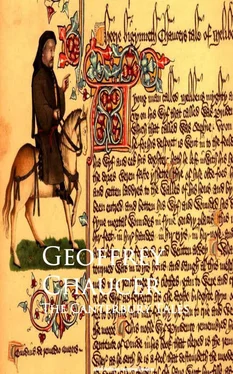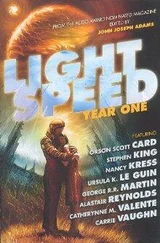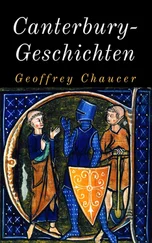1693. E. Hl. in; rest on. 1695. Hn. Cp. Pt. that; rest om.
And whan this duk was come un-to the launde,
Under the sonne he loketh, and anon
(840)
He was war of Arcite and Palamon,
That foughten breme, as it were bores two;
1700
The brighte swerdes wenten to and fro
So hidously, that with the leeste strook
It seemed as it wolde felle an ook;
But what they were, no-thing he ne woot.
This duk his courser with his spores smoot,
1705
And at a stert he was bitwix hem two,
And pulled out a swerd and cryed, 'ho!
Namore, up peyne of lesing of your heed.
(850)
By mighty Mars, he shal anon be deed,
That smyteth any strook, that I may seen!
1710
But telleth me what mister men ye been,
[50: T. 1713-1749.]
That been so hardy for to fighten here
With-outen Iuge or other officere,
As it were in a listes royally?'
1699. E. Cm. Hl. bores; rest boles. 1702. E. fille. 1706. E. cride; Hn. Cp. Pt. cryed. 1707. E. Hn. Ln. vp-on; rest vp. 1710. Hn. Cm. Cp. Pt. myster; E. mystiers; Ln. mester; Hl. mestir.
This Palamon answerde hastily,
1715
And seyde: 'sire, what nedeth wordes mo?
We have the deeth deserved bothe two.
Two woful wrecches been we, two caytyves,
(860)
That been encombred of our owne lyves;
And as thou art a rightful lord and Iuge,
1720
Ne yeve us neither mercy ne refuge,
But slee me first, for seynte charitee;
But slee my felawe eek as wel as me.
Or slee him first; for, though thou knowe it lyte,
This is thy mortal fo, this is Arcite,
1725
That fro thy lond is banished on his heed,
For which he hath deserved to be deed.
For this is he that cam un-to thy gate,
(870)
And seyde, that he highte Philostrate.
Thus hath he Iaped thee ful many a yeer,
1730
And thou has maked him thy chief squyer;
And this is he that loveth Emelye.
For sith the day is come that I shal dye,
I make pleynly my confessioun,
That I am thilke woful Palamoun,
1735
That hath thy prison broken wikkedly.
I am thy mortal fo, and it am I
That loveth so hote Emelye the brighte,
(880)
That I wol dye present in hir sighte.
Therfore I axe deeth and my Iuwyse;
1740
But slee my felawe in the same wyse,
For bothe han we deserved to be slayn.'
1716. E. Hn. disserued. 1718. E. Hn. Cm. owene. 1723. Hl. Hn. knowe; rest knowest. 1741. Ln. Hl. we haue.
This worthy duk answerde anon agayn,
And seyde, 'This is a short conclusioun:
Youre owne mouth, by your confessioun,
1745
Hath dampned you, and I wol it recorde,
It nedeth noght to pyne yow with the corde.
Ye shul be deed, by mighty Mars the rede!'
[51: T. 1750-1787.]
(890)
The quene anon, for verray wommanhede,
Gan for to wepe, and so dide Emelye,
1750
And alle the ladies in the companye.
Gret pitee was it, as it thoughte hem alle,
That ever swich a chaunce sholde falle;
For gentil men they were, of greet estat,
And no-thing but for love was this debat;
1755
And sawe hir blody woundes wyde and sore;
And alle cryden, bothe lasse and more,
'Have mercy, lord, up-on us wommen alle!'
(900)
And on hir bare knees adoun they falle,
And wolde have kist his feet ther-as he stood,
1760
Til at the laste aslaked was his mood;
For pitee renneth sone in gentil herte.
And though he first for ire quook and sterte,
He hath considered shortly, in a clause,
The trespas of hem bothe, and eek the cause:
1765
And al-though that his ire hir gilt accused,
Yet in his reson he hem bothe excused;
As thus: he thoghte wel, that every man
(910)
Wol helpe him-self in love, if that he can,
And eek delivere him-self out of prisoun;
1770
And eek his herte had compassioun
Of wommen, for they wepen ever in oon;
And in his gentil herte he thoghte anoon,
And softe un-to himself he seyde: 'fy
Up-on a lord that wol have no mercy,
1775
But been a leoun, bothe in word and dede,
To hem that been in repentaunce and drede
As wel as to a proud despitous man
(920)
That wol maynteyne that he first bigan!
That lord hath litel of discrecioun,
1780
That in swich cas can no divisioun,
But weyeth pryde and humblesse after oon.'
And shortly, whan his ire is thus agoon,
He gan to loken up with eyen lighte,
And spak thise same wordes al on highte:—
1785
The god of love, a! benedicite ,
[52: T. 1788-1823.]
How mighty and how greet a lord is he!
Ayeins his might ther gayneth none obstacles,
(930)
He may be cleped a god for his miracles;
For he can maken at his owne gyse
1790
Of everich herte, as that him list devyse.
Lo heer, this Arcite and this Palamoun,
That quitly weren out of my prisoun,
And mighte han lived in Thebes royally,
And witen I am hir mortal enemy,
1795
And that hir deeth lyth in my might also,
And yet hath love, maugree hir eyen two,
Y-broght hem hider bothe for to dye!
(940)
Now loketh, is nat that an heigh folye?
Who may been a fool, but-if he love?
1800
Bihold, for Goddes sake that sit above,
Se how they blede! be they noght wel arrayed?
Thus hath hir lord, the god of love, y-payed
Hir wages and hir fees for hir servyse!
And yet they wenen for to been ful wyse
1805
That serven love, for aught that may bifalle!
But this is yet the beste game of alle,
That she, for whom they han this Iolitee,
(950)
Can hem ther-for as muche thank as me;
She woot namore of al this hote fare,
1810
By God, than woot a cokkow or an hare!
But al mot been assayed, hoot and cold;
A man mot been a fool, or yong or old;
I woot it by my-self ful yore agoon:
For in my tyme a servant was I oon.
1815
And therfore, sin I knowe of loves peyne,
And woot how sore it can a man distreyne,
As he that hath ben caught ofte in his las,
(960)
I yow foryeve al hoolly this trespas,
At requeste of the quene that kneleth here,
1820
And eek of Emelye, my suster dere.
And ye shul bothe anon un-to me swere,
[53: T. 1824-1859.]
That never-mo ye shul my contree dere,
Ne make werre up-on me night ne day,
But been my freendes in al that ye may;
1825
I yow foryeve this trespas every del.'
And they him swore his axing fayre and wel,
And him of lordshipe and of mercy preyde,
(970)
And he hem graunteth grace, and thus he seyde:
1744. E. Hn. Cm. owene; Hl. Cp. Pt. owne. 1747. Hn. Pt. shul; Cm. Hl. schul; E. shal. 1753. E. estaat. 1754. E. debaat. 1767. Hn. Cm. Cp. As; rest And. 1770. Hl. Pt. Ln. had; rest hadde. 1771. Hn. wepten; rest wepen. 1788. E. hise. 1789. E. Hn. Cm. owene; Cp. Pt. owne. 1790. E. diuyse. 1797. Hl. I-brought; rest Broght, Brought. 1799. See note. Hl. if that; rest but if. 1810. E. Hn. Cp. of; rest or. 1811. and] Cm. Hl. or. 1817. E. Hn. Cp. Pt. laas; Cm. las; Hl. Ln. lace. 1818. E. Pt. trespaas. 1822. E. Hn. Cp. Ln. shal. contree] Cp. Ln. Hl. coroune. 1825, 1826. E. deel, weel; Hn. Cm. Cp. del, wel. Hl. Pt. swore; rest sworen, sworne, sworyn. 1828. Hl. Cm. graunted.
'To speke of royal linage and richesse,
1830
Though that she were a quene or a princesse,
Ech of yow bothe is worthy, doutelees,
To wedden whan tyme is, but nathelees
Читать дальше












